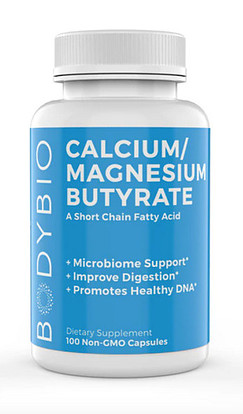Butyric Acid Supplement Benefits and My Top Pick
Butyric acid is a key part  of what comprises a healthy gut environment.
of what comprises a healthy gut environment.
Because gut health is one of the most important factors to consider when achieving and maintaining overall health, ensuring optimal butyric acid levels is an essential factor to acknowledge.
Here we will explore what butyric acid is, why it is so important for our health, butyric acid supplement benefits, some factors that can contribute to lowering our levels, and the best supplement I’ve ever found.
Some of the links in this article are affiliate links. This means that if you click the link and subsequently make a purchase on the merchant’s website, we may earn a small commission at absolutely no additional cost to you. All opinions are entirely my own. I have used all products mentioned personally for years.
What Is Butyric Acid?
Butyric acid is a short chain fatty acid that is important for several key areas of your health.
Technically, short chain fatty acids are fatty acids that contain fewer than 6 carbon atoms.
Butyric acid is primarily produced by probiotic bacteria in the intestines. These bacteria ferment resistant starches/fiber, and butyric acid is produced as a result.
This process occurs mostly in the large intestine/colon.
Resistant starch is a type of fiber that your body can’t break down, so it moves through the intestines intact.
Due to butyric acid being produced by probiotic gut bacteria, some refer to butyric acid as a “postbiotic.”
Along with probiotics themselves, butyric acid plays an incredibly important role in maintaining a healthy environment in the gut.
Specifically, some of the important roles of butyric acid are:
- Providing cells with energy so that they may function properly, particularly for cells that line the large intestine/colon called colonocytes
- Supporting gut lining integrity
- Supporting digestion
- Reducing inflammation
- Balancing blood sugar
- Supporting healthy DNA and genetic function
Furthermore, anything that supports your gut health, such as butyric acid, will support your overall health.
This is because the state of your gut has a great deal of influence on many important bodily functions and systems such as your brain health, immune function, mental & emotional health, detoxification capacity, hormone balance, and more.
What Causes Low Butyric Acid Levels?
Anything that can lower the level of good bacteria/probiotics in your gut can lower butyric acid levels, because these bacteria are your primary source of butyric acid.
Some factors that can contribute to the reduction of probiotic populations in your gut are:
- Gut Infections
Gut infections such as Small Intestinal Bacterial Overgrowth (SIBO), candida/fungal overgrowth, and parasitic infection can all contribute to a reduction of probiotic colonies in the gut.
This is because the pathogens that are involved with each of these types of infections can kill important strains of good bacteria in your gut such as bifidobacterium.
If such gut infections go untreated for considerable periods of time, probiotic presence in the gut continues to become compromised.
- Antibiotics
Antibiotics, while necessary sometimes in select cases, indiscriminately kill off all of the bacteria in the gastrointestinal tract, including the good bacteria/probiotics.
It is very important if you have to take antibiotics to focus on gut healing and repopulation of probiotics following the course of antibiotics.
It is also important to know that there are a plethora of powerfully effective natural antibiotic options as well, which do not have such a detrimental impact on one’s intestinal bacterial environment.
As a child, I had chronic ear infections and was on antibiotics for long periods of time. This certainly contributed to my development of gut imbalance at a young age.
- Processed Foods/Poor Diet
Processed foods that contain additives, synthetic preservatives, and other such ingredients have an adverse impact on gut health in a variety of ways.
These ingredients can contribute to the reduction of probiotic populations in the gastrointestinal tract, while encouraging the proliferation of pathogenic bacteria.
Furthermore, diets that are high in sugar can contribute to gut imbalance by feeding gut pathogens, which will further reduce probiotic presence.
Certain forms of gut testing can help to measure your butyric acid levels as well.
Personally, I had a Comprehensive Stool Analysis by Genova Diagnostics performed. The results indicated that I had significantly low butyric acid levels.
This wasn’t surprising, since I had been dealing with a slew of gut imbalances and infections and had very low levels of probiotic bacteria in my gut.
How To Increase Butyric Acid Levels in the Gut
As mentioned above, butyric acid is produced by the bacteria in your gut when you eat resistant starch/fiber.
It is also found in animal fats. The amount of butyric acid found in food sources is small, however, compared to the amount produced by gut bacteria themselves by fermenting resistant starch/fiber.
The best sources of resistant starch to encourage butyric acid production are:
- Asparagus

- Broccoli stems
- Apples with the skin
- Artichokes
- Garlic
- Onions
- Bananas, particularly when still partially green
- Plantains
- Carrots
- Pears with the skin
- Plums with the skin
Interestingly, the amount of resistant starch in particular foods has to do with the temperature of the food.
For example, there is higher amount of resistant starch found in the following sources after they have been cooked, then cooled:
- Rice
- Beans
- Oats
Some animal fats contain small amounts of butyric acid. This is because the bacteria in the gut of the animal produce butyric acid as well, which is then present in the milk produced by that animal. These sources include:
This is because the bacteria in the gut of the animal produce butyric acid as well, which is then present in the milk produced by that animal. These sources include:
- Butter
- Cow, goat, and sheep milk
- Ghee
- Hard cheeses such as parmesan cheese
The Best Butyric Acid Supplement
It can be challenging to acquire sufficient levels of butyric acid from food, as many people do not consume enough resistant starch to produce optimal amounts.
That is where a good quality butyric acid supplement comes in.
I first found Body Bio several years ago when looking into a good source of supplemental butyric acid and since I’ve been using their products, I have not been disappointed.
Out of the several butyrate supplements I’ve tried, Body Bio’s products have been the best and I would certainly  recommend them.
recommend them.
My Hair Tissue Mineral Analysis tests, as well as other testing, have always indicated low calcium and magnesium levels, so I usually stick to the Body Bio Calcium/Magnesium Butyrate.
Butyrate is the conjugate base of butyric acid/butanoic acid, which has 4 carbon atoms. This essentially means that a butyrate supplement is a buffered form of butyric acid, as it is joined by minerals such as calcium and magnesium.
Body Bio’s supplements are hypoallergenic and non-GMO.
This product is free of wheat, gluten, yeast, soy, dairy, corn, and artificial fillers or additives.
Dosing is always particular to the individual, but the standard dose for this product is 1 to 2 capsules per day with food.
I take 1 capsule, twice per day. 1 with breakfast and 1 with dinner.
Per follow-up gut testing, my butyric acid levels have continued to improve. I’ve also made good progress in my gut healing journey overall since adding them to my protocol.
This supplement is for sure a staple.
Click here to check it out.


It is important to note that butyric acid does have a pronounced scent to it. It smells similar to butter. This is totally normal and what it is supposed to smell like :).
In Closing…
As we’ve explored here, butyric acid is a key component for gut health, and henceforth, overall health.
Ensuring that you are including plenty of sources of resistant starch in your whole food eating plan and considering the use of a butyric acid supplement are important steps in achieving and maintaining optimal wellness.

REFERENCES